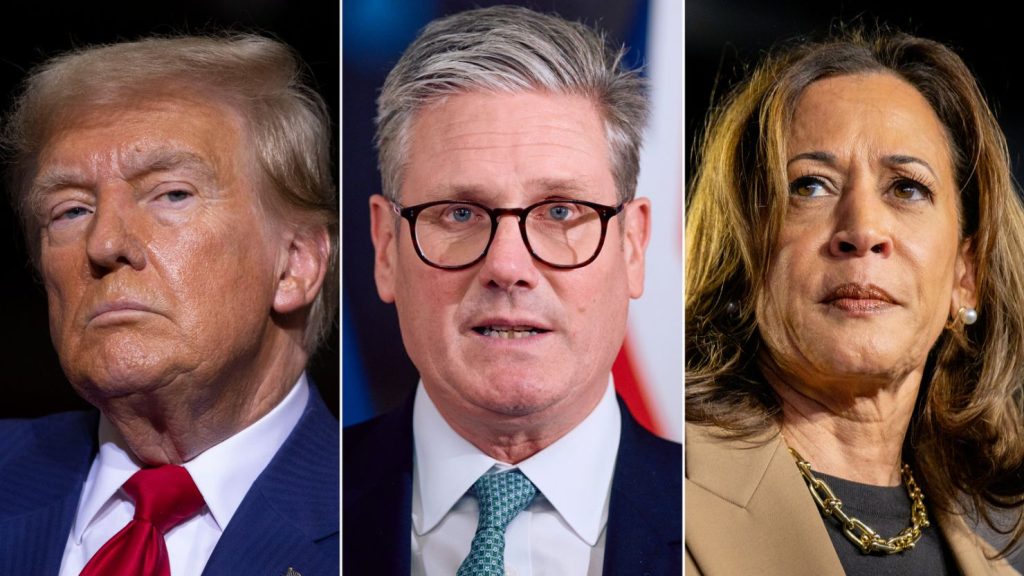
As the US election approaches, the dynamics of the long-standing “Special Relationship” between the United Kingdom and the United States are becoming increasingly intricate. A recent surge in British politics, led by Labour’s Keir Starmer, has drawn parallels to the ambitions of Vice President Kamala Harris, who hopes to replicate this success in her own election bid.
Starmer’s leadership marked a significant shift in British politics, culminating in Labour’s victory after 14 years of Conservative rule. This transformation is mirrored in Harris’s attempts to redefine her party’s approach and connect with a diverse electorate. While the official stance from Starmer’s government is to collaborate with whichever candidate wins, insiders note the similarities between Starmer and Harris’s journeys and ideologies.
“There are some really striking parallels,” said Claire Ainsley, Starmer’s former executive director of policy. She highlighted how both leaders must appeal to similar voter demographics and address concerns about crime and economic equity. Ainsley shared insights from Labour’s electoral strategies with senior Democratic figures, indicating a collaborative exchange of ideas that has prompted backlash from former President Donald Trump.
This election season, Trump accused Labour of “blatant foreign interference,” claiming that party staff had campaigned in key US battlegrounds. Labour defended the trip as personal and aboveboard, illustrating the growing tension in the Special Relationship. Trump’s remarks signal a shift away from the traditional political decorum that has characterized US-UK relations for decades.
The stakes are high, as the outcome of the US election could significantly impact British policy on trade, Ukraine, and NATO. Former adviser Ed Owen emphasized that the election’s results will reverberate throughout the UK’s international strategy.
As political tensions rise, figures like former Prime Minister Liz Truss have entered the fray, criticizing Labour’s engagement in American politics. Truss’s comments about the Labour Party’s perceived arrogance reflect the increasingly polarized atmosphere, where political allegiances and identities have blurred traditional boundaries.
Harris and Starmer share backgrounds as former prosecutors, allowing them to adopt a tougher stance on crime and immigration. This shared narrative aims to attract working-class voters who feel marginalized by current economic trends. However, the key difference lies in timing and context; Starmer had four years to rebuild Labour’s reputation, while Harris stepped into her role at a tumultuous moment, with little time to establish herself as a solid choice.

The looming presence of Trump adds complexity to the situation. His potential re-election raises concerns in Westminster, where many politicians view his leadership as part of a broader trend toward populism and far-right politics. The consensus among Labour members is clear: a Trump presidency would complicate relations and divert attention from key international issues.
While President Biden’s administration is rooted in traditional foreign policy, Harris’s background is less defined by international relations, raising questions about how she would navigate this complex landscape. Moreover, a Trump administration might signal a shift in US support for Ukraine, a matter of vital importance for Britain.
As the political climate shifts, there is an understanding in Westminster that a Labour government would likely prefer a Democratic president. Polling indicates that Trump remains deeply unpopular in the UK, making the Labour Party’s alignment with Harris more favorable.
In this evolving context, some see opportunities for influence despite the potential challenges of a second Trump term. Observers note that unpredictability could open doors for new alliances and discussions about American policy.
Reflecting on past experiences, some British politicians believe they can adapt to Trump’s leadership style. They acknowledge the unique historical ties and cultural resonances that could facilitate cooperation, even amidst tensions.
The ramifications of this election extend beyond the immediate political landscape. The rise of centrist leadership in a world increasingly dominated by populism poses a critical question for figures like Starmer: How will they navigate the potential pressures and responsibilities of leading global democracy?
As the US election approaches, the evolving relationship between the UK and the US remains under scrutiny, highlighting both the challenges and opportunities that lie ahead. The stakes are high, and the outcome will undoubtedly shape the future of transatlantic relations.








